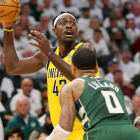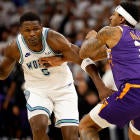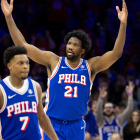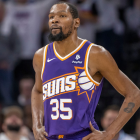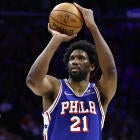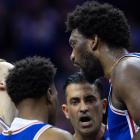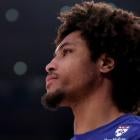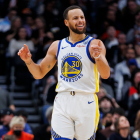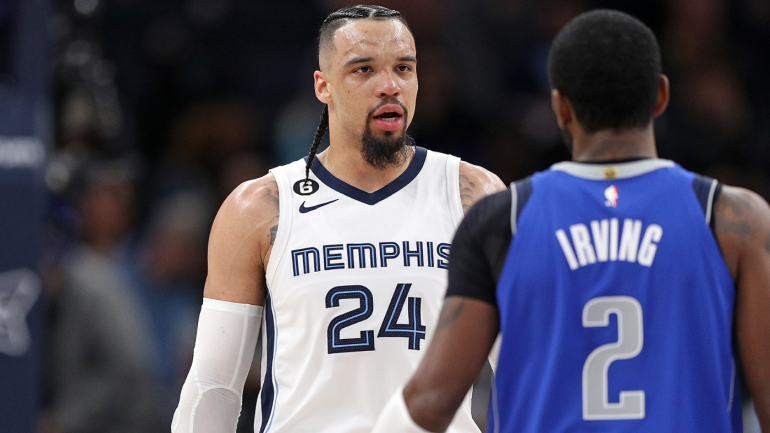
Dillon Brooks is not going to get $25 million per year on the free agent market. That seems like a reasonable place to start this after ESPN's Ramona Shelburne reported that is what he is seeking on the open market. That's more than Mikal Bridges and OG Anunoby make, and they represent the top of the 3-and-D market (though Bridges has since evolved into quite a bit more). Even if Brooks was worth as much as they are, cap space has become such a rarity in the modern NBA that deals of that size are scarce. Only six free agents got $25 million per year last season, and only two of them, Jalen Brunson and DeAndre Ayton, signed those deals with new teams.
Brooks will need to find a new team. The Athletic's Shams Charania reported Tuesday that Brooks has been informed that the Grizzlies will not bring him back under any circumstance. If Brooks is really set on making $25 million per year, the Grizzlies were his best bet. They could have re-signed him for anything up to his max if he'd stayed put thanks to his Bird Rights. Making that kind of money for a new team is much harder. He'll either need to land with one of the teams preparing to use cap space or engineer a sign-and-trade. The former is unlikely due to the scarcity of cap space users. The latter is unlikely because... well... who's especially eager to give up value for Brooks after the series he just had?
At this stage, Brooks would be lucky to get half of what he's asking for. That would take him right around the non-taxpayer mid-level exception, somewhere between $12-13 million annually. For a flawed but solid starter, that's a fair price. So who could give it to him? Here are five sensible destinations for Brooks now that the Grizzlies are off the table.
1. Cleveland Cavaliers
I know what you're thinking: the least efficient offense of the postseason is going to sign the guy who just shot 10-of-42 from 3-point range? Donovan Mitchell is going to forgive Brooks for their February altercation? Here's the logic:
- Cleveland doesn't necessarily need offense so much as it needs playable bodies. The Cavaliers closed Game 1 of this series with Cedi Osman on the floor. Cleveland was so desperate for wing production that they gave Danny Green nearly half as many playoff minutes (40) as he played for them in the entire regular season (95). Starting-caliber wings are the rarest commodity on the free agent market, especially for teams limited to cap exceptions.
- The Knicks just bullied the Cavs for five games on their way to a relatively comfortable victory. Cleveland could really use more physicality, and their relatively quiet roster could probably use an agitator.
- Standstill shooting is almost always available for the minimum. Phoenix nabbed Damion Lee for a bit more than $2 million and he shot over 44% from deep this season. Boston locked Sam Hauser up for three years at a cost of less than $6 million in total. Cleveland can find playable offense without devoting major resources to it.
- Brooks was, at one time, a good offensive player. He shot over 35% from 3-point range in his first four NBA seasons and averaged 18.4 points per game as recently as last season. As bad as he was against the Lakers, remember, he averaged 25.8 points per game against the Utah Jazz in the first round two years ago. There's upside here.
- Cleveland is used to limited spacing after starting Isaac Okoro for most of the season, but if it becomes too problematic, they can always downsize for high-leverage possessions and move Evan Mobley to center. At present, Joel Embiid is the only Eastern Conference player really equipped to punish them for that.
- The Cavaliers are incentivized to add salary in the next few offseasons because once Mobley gets his rookie extension, they'll likely be so far above the tax line that adding eight-figure salaries will become difficult. Get Brooks in the building, see if it works, and if it doesn't? Trade him for a better fit.
Brooks is a flawed player, but at the bare minimum, he's a better player than Okoro right now. It's hard to imagine Cleveland doing much better for its mid-level exception, especially in such a weak free agent class for wings. They might have to jettison a contract or two if they plan to retain Caris LeVert, but it's not as though Osman and Ricky Rubio are essential. For all of Brooks' flaws, he's a proven starter available at a price Cleveland can probably afford. There are so few other wings that check both of those boxes this offseason that the Cavaliers may have no choice but to consider him.
2. Houston Rockets
Opposing players spent most of the season criticizing Houston's youngsters. They dribble too much. They shoot too much. They don't run an offense. These aren't exactly problems that Brooks can help fix. If anything, he'd contribute to them. What he can help do for them is establish a defensive culture. Young players need veterans around to set a tone on that end of the floor, and Brooks can reliably do so. New coach Ime Udoka had a ton of success building a defense around Marcus Smart in Boston. While Smart isn't quite as controversial, the concept of a loud, ultra-versatile perimeter defender as the focal point of a defense is right in Udoka's wheelhouse.
Money isn't an issue for Houston. The Rockets will have max cap space and then some, and they plan to go big-game hunting. James Harden is the rumored target, but they'll look at every high-end scorer available. Brooks would be the target with whatever is left of their cap space after that. He wouldn't be Houston's headliner, but defensive culture-setters rarely are. That doesn't make them any less important. Boston wouldn't have reached the Finals without Smart, and Houston needs a defensive centerpiece as much as it needs an offensive cornerstone.
3. Sacramento Kings
The Kings are in an interesting position. Despite earning the No. 3 seed in the Western Conference, they actually have a fairly clear path to significant cap space. If they let Harrison Barnes walk, they can get to around $20 million in space. That felt unlikely before the Warriors series... but then Barnes shot just 24% from 3-point range and played just 29 combined minutes in the last two games of the series. Why would the Kings pay starter money to a 30-year-old they don't trust in big games?
If they do open up that cap space, defense is going to be the priority. The Kings ranked 24th in defense this season and just allowed Stephen Curry to score 50 against them in an elimination game. Brooks has defended Curry as well as anyone in the current NBA. In the four games Brooks played against him in the 2022 playoffs, Curry shot below 40% from the field. More importantly, he can move up the positional spectrum and defend elite forwards when the matchups require it. Nobody else on Sacramento's roster can say the same. Whether it's Brooks or someone else, expect the Kings to take advantage of their cap flexibility this offseason. They can improve upon the Barnes slot.
4. Indiana Pacers
The Pacers are so thin at forward that the 6-foot-4 Buddy Hield started most of the season at small forward. They're loaded in the backcourt with Hield, Tyrese Haliburton, Benedict Mathurin, Chris Duarte and Andrew Nembhard, but all of those players are offense-first. There might not be a natural small forward anywhere on this roster, and Myles Turner shoots 3-pointers well enough to keep the offense moving even if Brooks messes with Indiana's spacing.
The Pacers have the cap space to make a splash this offseason, but do they have the interest? Indiana typically builds its rosters conservatively, rarely jumping into free agency and always operating with a shoestring budget. Brooks isn't taking a discount to join the Pacers. Even if he would, Rick Carlisle is known for prioritizing spacing, and his tolerance for shenanigans is minimal. This is an on-court fit. It might not be an off-court fit.
5. Dallas Mavericks
Dallas doesn't have the financial flexibility to sign Brooks at anywhere near his preferred price. This is his rock-bottom destination, but it's hardly unprecedented. Montrezl Harrell expected a hefty long-term deal from the Clippers before the 2020 postseason. His market dried up after he got exposed by the Nuggets. So he tried his luck on a one-year, discount deal with the Lakers hoping to rebuild his value and try again one year later. DeMarcus Cousins took the same approach in 2018 by signing with the Warriors. If a player believes in his long-term earning potential and the market disagrees, he'll occasionally take a big one-year hit to get to a destination that he believes can inflate his value for the following summer.
The Mavericks have the best shot-creating duo in the NBA, assuming they re-sign Kyrie Irving. They can afford the spacing hit that comes with playing Brooks, but they're absolutely desperate for his defense. Dallas allowed more than 118 points per 100 possessions after the Irving trade, and elite perimeter defenders don't exactly grow on trees. The Mavericks would probably prefer to devote their roster-building resources to the center position, but that's an easier archetype to add on the trade market. If the market dries enough on Brooks for him to take the taxpayer mid-level exception, the Mavericks should be at the top of his list.














